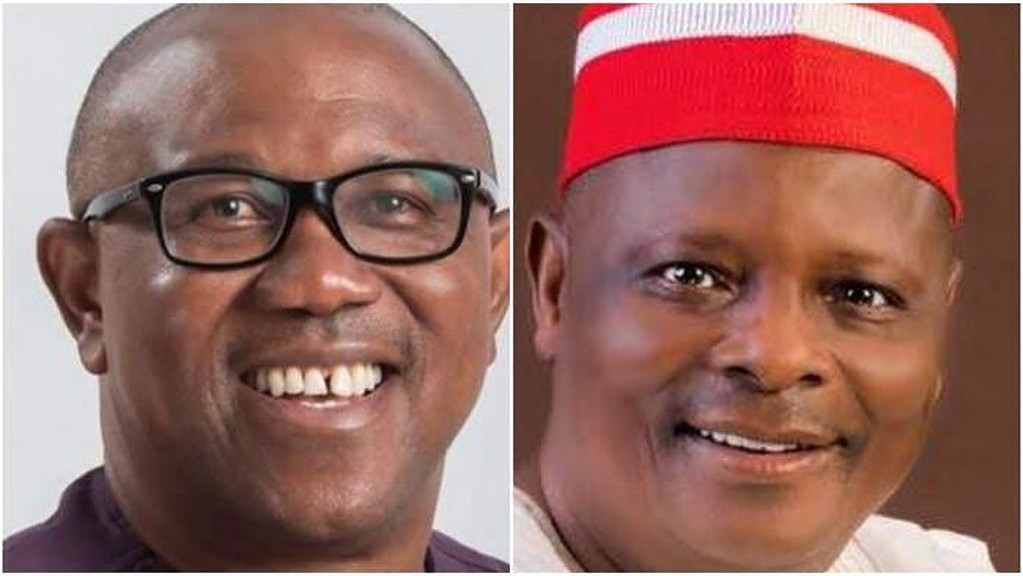2023: Latest Survey Forecasts Fresh Obi-Kwankwaso Alliance For Presidential Election
Despite the collapse of initial talks for an alliance between Peter Obi and Rabiu Kwankwaso, indications have emerged that Obi, who is the Labour Party presidential candidate, may still secure an alliance that will lead to his endorsement by candidates of at least six political parties ahead of the February 25 poll.
Dr. JO Ebhomenye, President and Founder of Market Trends International (MIT), told THE WHISTLER on Wednesday that the indications emerged from recent surveys conducted by the research consulting firm on the 2023 presidential election.
Advertisement
The results of the surveys conducted in November 2021, June 2022, and December 2023 suggest that Obi’s Labour Party “may receive boosts to achieve lasting alliance talks” with presidential candidates of the New Nigeria Peoples Party (NNPP), Zenith Labour Party (ZLP), Allied Peoples Movement (APM), National Rescue Movement (NRM), Peoples Redemption Party (PRP), and African Democratic Congress (ADC), among others.
The initial alliance talks between Obi and Kwankwaso had collapsed, with the NNPP national chairman, Prof Rufai Alkali, blaming the LP camp for insisting that the NNPP concedes the presidency to its candidate.
Obi, based on result of the latest survey, received the “highest favourable rating to be the next president of Nigeria,” with 44% of the respondents indicating they will vote him at the polls, thereby “halting” the ruling All Progressives Congress (APC) and the main opposition People’s Democratic Party (PDP) from dominating the upcoming elections.
Ebhomenye told THE WHISTELR that respondents are optimistic that alleged alliance talks between Obi and candidates of less popular parties will form a united front to stop either of Bola Ahmed Tinubu and Atiku Abubakar — who are the respective candidates of the APC and PDP — from winning the poll.
Advertisement
“We interpreted the peoples voice, that’s the way. When you conduct a survey, you collate the results and then you publish it. It’s not our voice, it’s (from) the people we interviewed (and) that’s what they recommended.
“There were a set of questions we asked them (respondents), starting with if they are registered to vote to be sure that these are people who are actually going to vote during the election. So, whatever they told us is what you seeing,” he said, adding that the surveys were conducted physically in rural areas and online in the urban others with about 4,000 respondents.
In an earlier statement signed by its Executive Director, Victor Ebhomenye, MIT said its survey conducted in three phases (December 21, June 2022, and December 2022) showed that “The PDP was initially seen as the most popular party to win the 2023 presidential election as at December 2021, with 52% of respondents indicating PDP to win were elections to be held in December 2021.”
But PDP/Atiku’s popularity among the respondents was said to have drastically dropped to 28%, a situation attributed to the crisis that hit the PDP after five southern governors of the party known as ‘the G5’ withdrew support for its presidential candidate.
“Ever since the loss of the party’s presidential ticket in May 2022 and being overlooked as the running mate to the flagbearer, Alh. Atiku Abubakar, the executive Governor of Rivers State, Gov, Wike and four other PDP governors (popularly known as the G5 Governors) have constituted themselves into an opposition within the PDP. It is believed that these G5 governors (Seyi Makinde, Samuel Ortom, Okezie Ikpeazu, Ifeanyi Ngwuanyi and Nyesom Wike) discretely withdrew their support for Atiku Abubakar and this could be one factor to explain the drastic fall in support for the PDP. This has also contributed to Bola Ahmed Tinubu and Peter Obi gaining more grounds in the upcoming presidential election race,” the statement said.
Advertisement
It added, “When asked to advise the incoming president on challenges to tackle immediately he resumes office, Nigerians advised the incoming president to make Insecurity (46%), Collapsed Economy (20%), and Unemployment (18%) his top priority.”
MTI has been conducting surveys in Nigeria and other African countries for over 30 years.



